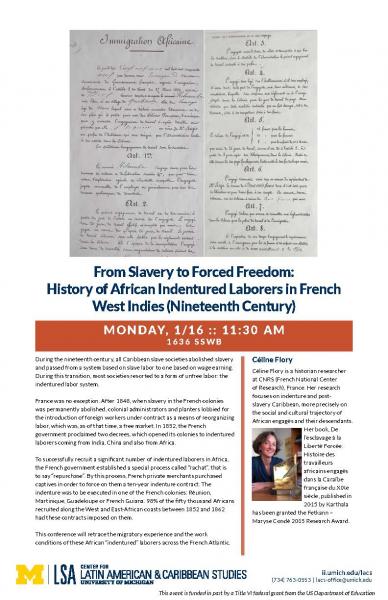The Center for Latin American and Caribbean Studies (LACS) together with the Brazil Initiative at LACS feature presenters from diverse disciplines. LACS organizes and sponsors more than 50 public lectures, workshops, performances, and conferences over the course of the academic year.
In addition to our yearly programming, the Center for Latin American and Caribbean Studies (LACS) and the Brazil Initiative at LACS are happy to consider funding requests to co-sponsor lectures, events, performances, and activities that coincide with the center's mission to promote a broad and deep understanding of the region. Request to co-sponsor an event »
LACS Lecture. From Slavery to Forced Freedom: History of African Indentured Laborers in French West Indies (Nineteenth Century)
Céline Flory, Centre national de la recherche scientifique (France)
During the nineteenth century, all Caribbean slave societies abolished slavery and gradually passed from a system based on slave labor to a system based on wage earning. During this transition, most societies resorted to a form of unfree labor: the indentured labor system.
France was no exception. After 27 April 1848, when slavery in the French colonies was permanently abolished, colonial administrators and planters lobbied for the introduction of foreign workers under contract as a means of reorganizing labor, which was, as of that time, a free market. In 1852, the French government proclaimed two decrees, which opened its colonies to indentured laborers coming from India, China and also from Africa.
To successfully recruit a significant number of indentured laborers in Africa, the French government established a special process called “rachat”, that is to say “repurchase”. By this process, French private merchants purchased captives in order to force on them a ten-year indenture contract. The indenture was to be executed in one of the French colonies: Réunion, Martinique, Guadeloupe or French Guiana. 98% of the fifty thousand Africans recruited along the West and East-African coasts between 1852 and 1862 had these contracts imposed on them.
This conference will retrace the migratory experience and the work conditions of these African “indentured” laborers across the French Atlantic.
Céline Flory is a historian researcher at CNRS (French National Center of Research), France. Her research focuses on indenture and post-slavery Caribbean, more precisely on the social and cultural trajectory of African engagés and their descendants. Her book, De l’esclavage à la Liberté Forcée. Histoire des travailleurs africains engagés dans la Caraïbe française du XIXe siècle, published in 2015 by Karthala has been granted the Fetkann – Maryse Condé 2015 Research Award.
France was no exception. After 27 April 1848, when slavery in the French colonies was permanently abolished, colonial administrators and planters lobbied for the introduction of foreign workers under contract as a means of reorganizing labor, which was, as of that time, a free market. In 1852, the French government proclaimed two decrees, which opened its colonies to indentured laborers coming from India, China and also from Africa.
To successfully recruit a significant number of indentured laborers in Africa, the French government established a special process called “rachat”, that is to say “repurchase”. By this process, French private merchants purchased captives in order to force on them a ten-year indenture contract. The indenture was to be executed in one of the French colonies: Réunion, Martinique, Guadeloupe or French Guiana. 98% of the fifty thousand Africans recruited along the West and East-African coasts between 1852 and 1862 had these contracts imposed on them.
This conference will retrace the migratory experience and the work conditions of these African “indentured” laborers across the French Atlantic.
Céline Flory is a historian researcher at CNRS (French National Center of Research), France. Her research focuses on indenture and post-slavery Caribbean, more precisely on the social and cultural trajectory of African engagés and their descendants. Her book, De l’esclavage à la Liberté Forcée. Histoire des travailleurs africains engagés dans la Caraïbe française du XIXe siècle, published in 2015 by Karthala has been granted the Fetkann – Maryse Condé 2015 Research Award.
| Building: | School of Social Work Building |
|---|---|
| Event Type: | Lecture / Discussion |
| Tags: | History, International, Latin America, Social Justice |
| Source: | Happening @ Michigan from Center for Latin American and Caribbean Studies, International Institute |


